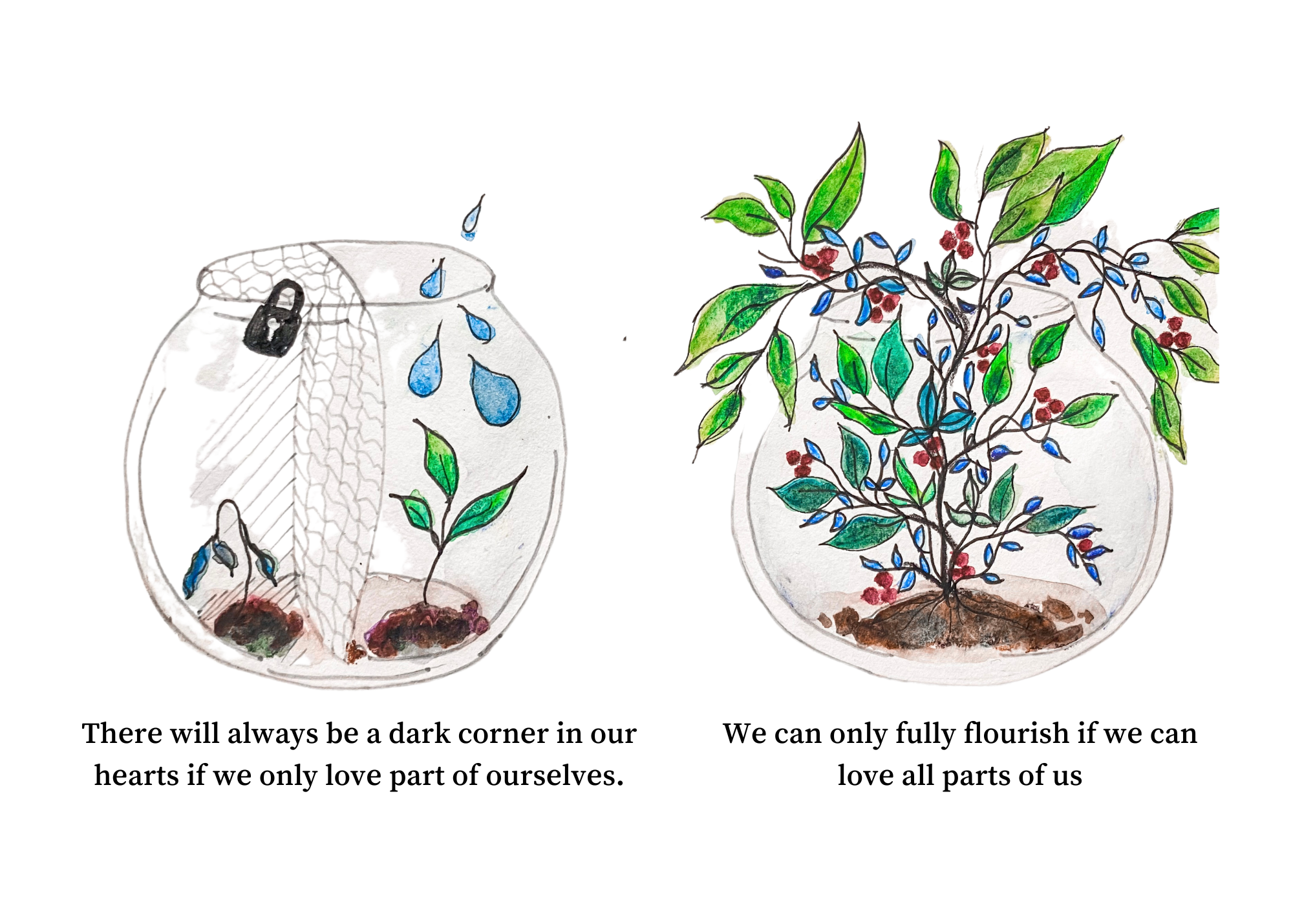Love Yourself in the Language You Feel Less Loved

When my friend Hannah asked me: “So, are you going to have bilingual education for your kids?” My body froze. My brain stopped functioning. This is the hardest question I have faced as a mom-to-be.
Before I got pregnant, my husband and I both wanted to raise our kids to speak Chinese in addition to English, so that they could communicate with my parents. It would also be a way to let them understand their cultural roots. But after really being pregnant for the past few months, I no longer knew the answer.
Learning the Language of Love
Throughout the years of living back and forth between the US and Taiwan, I shifted between two identities. My English side, Angie, is confident, ambitious, proud, encouraging, outgoing, and as I do say so myself, a badass. My Taiwanese side, Yu-Hsiu, is humble, self-critical, reserved, and harsh on herself. I’ve gotten better at integrating these two living in different countries and being married to a partner from the US. But my American friends would still tell me that I was underselling myself, while my Taiwanese family would warn me I was too full of myself at the same time.
The hardest thing is the language of love. I found out it’s very difficult for me to imagine talking to my baby girl with love in Chinese. My mom loved me. But as a typical Taiwanese mom who was born and raised in Chinese culture, saying out loud the word “I love you” was rare. Instead, cooking ridiculous amounts of food and keeping me stuffed with mangos were her love language, as it is for many Asian mothers around the world.
Fortunately, I later learned how to express my love in spoken language through my American husband and my mother-in-law. I learned how to say “You are a very capable human.” “I’m very proud of you,” and “I love you so much” in English confidently and expressively after becoming part of my American family.
A few weeks into my pregnancy, I started to talk to my baby and sing silly, loving songs I made for her every day in the shower. “Why you gotta be so cute 🎶 You are mommy’s cutie pie 🎶 Mommy loves you so much 🎶 🎶 “ is one song I sang a lot (I promise its much better live!) I tried to talk to her in Chinese at the beginning, but all the Chinese words that came out of my mouth were borderline sarcastic or demeaning jokes my mom had told me from childhood. The little Taiwanese girl inside me never got updated on how to express love in Chinese. I felt sad but not knowing what to do, I just quit. For a few months, I spoke only English to the baby inside me. The truth is, I was avoiding the relationship I had with my Taiwanese identity, my inner Yu-Hsiu.
A Scary Experiment
I finally decided to speak Chinese to my baby after my friend Sarah gave me a wake-up call.
“But you gotta do it. You have to try hard to speak those positive, loving words to your baby. That’s the only way you can rewire that part of your brain and learn how to love the childhood version of you, too!”
She was right. I can’t avoid speaking my own language my whole life. I started to practice speaking Chinese to my baby girl. It was awkward at the very beginning. Everything sounded like Google Translate. I realized that hiding under this awkwardness was a sense of discomfort. I feel like I don’t have the right to express love in Chinese because I never experienced people saying “love” to me as a kid.
It’s like… I didn’t deserve to be loved.
But I didn’t give up. I went from speaking two Chinese sentences daily to adding three to five sentences every day. Surprisingly within just one week, I could already sing a whole song in Chinese to her! I sing to her that “媽咪好愛你🎶 你是媽咪的驕傲 🎶你是媽咪永遠的寶貝🎶,” meaning I’m proud of her, that I love her and she will always be the love of my life. It definitely still feels a bit robotic and needs lots of effort, but I’m happy about the progress I’ve made.
Reconcile My Double-identity
Slowly, I started to feel I was less and less inclined to avoid the Chinese part of me. I have written many self-love articles before. But by talking to my baby girl in Chinese, my Chinese-speaking inner child also finally acquired the language of love. By committing to loving my baby girl in both languages of her cultural roots, I’m not only preventing the separation in her, but I’ve also been healing the separation in me. The Angie that is eloquent in the love language and the Yu-Hsiu that needs affirmation of love finally start to merge into one.

Embracing Your Native Tongue
If you are also living this double life, feeling you can only feel loved or capable of loving in a certain language or culture, try to speak the loving language to yourself, too. Language is not just a tool. It’s a representation of a whole cultural system. It’s how we build our identity and the map of our inner world. By talking to yourself in the language you feel less loved, you can rewire your brain, and start to rewrite your identity. Repeat the words you want to hear to yourself as a mantra. Write a love letter to yourself. These things are not easy, but they are worth it. Our inner child deserves to be loved and celebrated in the culture where we come from. And by rebuilding our old identity in a new loving way, we will find a whole and complete self on the other side of the journey, waiting for us.